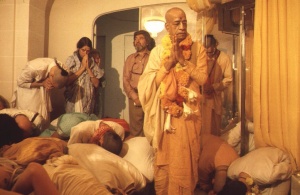SB 3.12.4

A.C. Bhaktivedanta Swami Prabhupada
TEXT 4
- sanakaṁ ca sanandaṁ ca
- sanātanam athātmabhūḥ
- sanat-kumāraṁ ca munīn
- niṣkriyān ūrdhva-retasaḥ
SYNONYMS
sanakam — Sanaka; ca — also; sanandam — Sananda; ca — and; sanātanam — Sanātana; atha — thereafter; ātma-bhūḥ — Brahmā, who is self-born; sanat-kumāram — Sanat-kumāra; ca — also; munīn — the great sages; niṣkriyān — free from all fruitive action; ūrdhva-retasaḥ — those whose semen flows upwards.
TRANSLATION
In the beginning, Brahmā created four great sages named Sanaka, Sananda, Sanātana and Sanat-kumāra. All of them were unwilling to adopt materialistic activities because they were highly elevated due to their semen's flowing upwards.
PURPORT
Although Brahmā created the principles of nescience as a matter of necessity for those living entities who were destined to ignorance by the will of the Lord, he was not satisfied in performing such a thankless task. He therefore created four principles of knowledge: sāṅkhya, or empirical philosophy for the analytical study of material conditions; yoga, or mysticism for liberation of the pure soul from material bondage; vairāgya, the acceptance of complete detachment from material enjoyment in life to elevate oneself to the highest spiritual understanding; and tapas, or the various kinds of voluntary austerities performed for spiritual perfection. Brahmā created the four great sages Sanaka, Sananda, Sanātana and Sanat to entrust them with these four principles of spiritual advancement, and they inaugurated their own spiritual party, or sampradāya, known as the Kumāra-sampradāya, or later on as the Nimbārka-sampradāya, for the advancement of bhakti. All of these great sages became great devotees, for without devotional service to the Personality of Godhead one cannot achieve success in any activity of spiritual value.